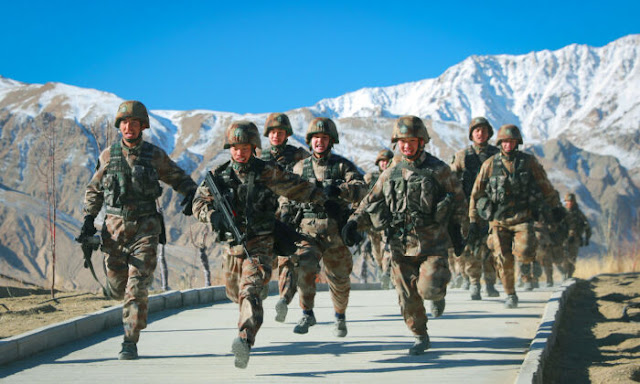

Photo from January 4, 2021 shows Chinese soldiers participating in military training at Pamir Mountains in Kashgar, north-western China's Xinjiang region (Photo: STR/AFP via Getty Images)
Two reports—China Military Power Report released yesterday and the National Defense Strategy released in October—in barely one month by the US show that Washington looks at China as a “consequential and systemic challenge”.
The two reports build on the US Interim National Security Guidance paper, a 21-page document, which Joe Biden had issued in March soon after taking over as US President last year.
The China Military Power Report (CMPR), notes that in an effort to transform the international system to make it favourable to China, it is willing to implement coercive military behavior. “We’ve seen more coercive and aggressive actions in the Indo-Pacific region, including some of which we would highlight as being dangerous,” an officical said.
Talking about the Chinese approach towards India, the CMPR report highlights that China has been putting pressure on the US not to partner with India. The report prepared by the Pentagon says: “PRC [People’s Republic of China] officials have warned US officials to not interfere with the PRC’s relationship with India”.
It also says that since the 2020 clash, the PLA has maintained “continuous force presence and continued infrastructure build-up along the LAC”, highlighting that China has consistently sought to downplay the Galwan Valley attack which resulted in deaths on the LAC in 2020 for the first time in decades.
For nearly three years now Beijing has been asserting itself militarily against its neighbours in South Asia as well as in East Asia over its revanchist policies of land grab and island usurpation.
Regarding Taiwan, the CMPR report says that China has “intensified” diplomatic, economic, political and military pressure against Taiwan. “The PLA will likely continue to increase military pressure—in concert with diplomatic, information, and economic pressure—in an attempt to compel Taiwan toward unification”, says the report.
The report highlights how China is integrating its economic, political, social, military and security developments “to support the ambitious objectives that Xi Jinping has laid out for national rejuvenation by 2049”.
This report follows the National Defense Strategy (NDS) released on October 27, which will guide the defence department “to protect the American people, to promoting global security, to seizing new strategic opportunities, and to realizing and defending our democratic values”. The defence strategy says that China poses a multi-domain threat to the US and the US has to prioritise the PRC challenge in the Indo-Pacific region.
The NDS says that a most comprehensive and serious challenge to US national security is China’s “aggressive endeavor to refashion the Indo-Pacific region and the international system to suit its interests”. It says that China is not just trying to undermine US alliances and security partnerships in the Indo-Pacific region but is also coercing its neighbors.
It highlights the conflicts that China has created in the spread-out region—the Taiwan Strait crisis, the South China Sea tensions and the military build-up along the Line of Actual Control (LAC) with India.
The US plans to take on China by reinforcing and building a resilient security architecture in the Indo-Pacific region through advanced technology cooperation with AUKUS and the Indo-Pacific Quad of USA, Japan, India and Australia.
That China poses a bigger challenge has become a recurrent theme in various US administrations. The Biden administration has arrived at the same conclusions which former president Donald Trump had articulated about China over many years.
Also Read: US and Japan plan to stockpile weapons in Taiwan, Japan in case of conflict with China
US President Donald Trump on Saturday (US local time) called the continuation of the trial…
Protestors in Serbia took to the streets of Belgrade and demanded an early election, as…
The Ministry of External Affairs (MEA) on Sunday strongly rejected the Pakistani Army's claims, where…
Indian Army strengthens ties with Russian Land Forces at the 4th Indo-Russian Inter-Governmental Commission (IRIGC)…
The Indo-French Joint Military Exercise SHAKTI-VIII continues to strengthen operational interoperability and mutual cooperation between…
Prime Minister Narendra Modi attended the centenary celebrations of the revered Jain spiritual leader Acharya…